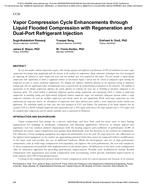Description
In very low outdoor ambient temperature regions, both heating capacity and coefficient of performance (COP) of traditional air-source vapor compression heat pumps drop significantly with the decrease in the outdoor air temperature. Many alternative technologies have been investigated for improving the efficiency of vapor compression cycles and two methods have been proposed in this paper. The first method is liquid flooded compression with regeneration in which a significant amount of non-volatile liquid is mixed into the stream of refrigerant vapor entering the compressor in order to achieve isothermal compression. The flooding also improves volumetric efficiency by the improved sealing of compressor leakage gaps and can significantly reduce thermodynamic losses associated with the desuperheating of refrigerant in the condenser. The addition of regeneration to the flooded compression improves the system efficiency by reducing the losses due to throttling of two-phase refrigerant in the expansion device. The second method is multi-port refrigerant injection during compression and economizing which is similar to multi-stage compression in providing cooling and higher-density refrigerant between compressor stages, but multi-port refrigerant injection within a single compressor eliminates the need for multiple compressors and thereby lowers the cost significantly. While multi-stage compression has been implemented for large-scale devices, the development of compressors with vapor injection ports within a scroll compressor enables smaller-scale application. The simulation models for both cycles have been developed in EES and Python. The predictions of the model indicates that the seasonal COP of a R410A flooded compression with regeneration cycle is 10% higher while that of the vapor injection cycle is 13% higher than the standard vapor compression cycle for climatic conditions such as experienced in Minnesota.
Citation: Cold Climate Conference, 2012
Product Details
- Published:
- 2012
- Number of Pages:
- 8
- File Size:
- 1 file , 1 MB
- Product Code(s):
- D-CCC12-30
